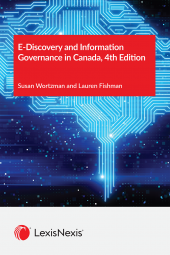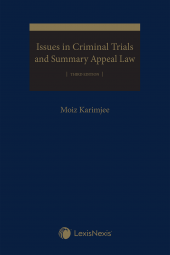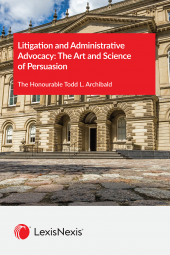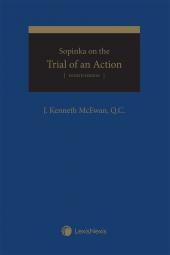E-Discovery and Information Governance in Canada, 4th Edition
One Year Subscription Only Terms
Subscribers receive the product(s) listed on the Order Form and any Updates made available during the annual subscription period. Shipping and handling fees are not included in the annual price.
Subscribers are advised of the number of Updates that were made to the particular publication the prior year. The number of Updates may vary due to developments in the law and other publishing issues, but subscribers may use this as a rough estimate of future shipments. Subscribers may call Customer Support at 800-833-9844 for additional information.
Subscribers may cancel this subscription by: calling Customer Support at 800-833-9844; emailing customer.support@lexisnexis.com; or returning the invoice marked 'CANCEL'.
If subscribers cancel within 30 days after the product is ordered or received and return the product at their expense, then they will receive a full credit of the price for the annual subscription.
If subscribers cancel between 31 and 60 days after the invoice date and return the product at their expense, then they will receive a 5/6th credit of the price for the annual subscription. No credit will be given for cancellations more than 60 days after the invoice date. To receive any credit, subscriber must return all product(s) shipped during the year at their expense within the applicable cancellation period listed above.
Détails des produits
The world continues to find itself in the midst of a data explosion. This increased volume of electronically stored information has become even more essential in litigation and regulatory matters. The heightened importance and value of this information has driven organizations to re-evaluate how their information is managed. As organizations pivot from a reactive approach to e-discovery to one that is proactive, Information Governance has become an integral part of the process for managing these challenges.
E-Discovery and Information Governance in Canada, 4th Edition provides invaluable insights into e-discovery, organizational Information Governance, and the critical relationship between them. Formerly published as E-Discovery in Canada, this new edition is authored by Susan Wortzman and Lauren Fishman, two of Canada's highly respected e-discovery lawyers, plus a team of experienced contributors.
Features of This Book
- Addresses Canada's unique e-discovery issues, featuring recommendations, principles, guidelines and best practices
- Highlights the most relevant e-discovery-related changes to the various rules of court
- Describes project management principles in the e-discovery process, including how to structure the project to mitigate or eliminate scope creep and other challenges
- Contains the most relevant and recent case law since the previous edition published 5 years ago
- Valuable appendices, including an updated chart comparing the civil procedure rules of each Canadian jurisdiction with regard to relevance and proportionality
What’s New In This Edition
- New chapter on Information Governance Risks and Rewards, including a comprehensive discussion of the importance of implementing robust Information Governance programs and solutions within organizations and strategies for execution
- Best practices for developing and implementing Information Governance programs
- Revised chapter on Organizational Data Privacy in Canada including a survey of privacy law and the connection to corporate Information Governance
- Updated chapter focusing on Best Practices for E-Discovery Collaboration Between Counsel, reflecting important developments relating to how counsel should collaborate with opposing parties in their approach to e-discovery
- Updated Sedona Conference Principles as of January 2022 with detailed commentary
Who Should Read This Book
- Litigation lawyers – for a basic understanding of how the e-discovery process works, and be familiar with the Rules and jurisprudence relating to e-discovery
- In-house lawyers – for advising corporations on how to establish a process for responding to discovery requests as a result of a civil litigation, criminal investigation, regulatory enquiry, internal investigation or a regulatory compliance disclosure
- Law clerks/paralegals – for a basic understanding of how the e-discovery process works and which Rules apply and how to apply them
- Judges – as a reference to guide in the process of formulating and rendering a decision in the area of e-discovery
- Law libraries – a valuable addition to any collection of books on civil procedure and discovery practices
Contributors
Rachael Chadwick
Lisa Chung
Doura Dagher
Lauren Grimaldi
Michael Lalande
Gordon Lee
Daniel Michaluk
Chuck Rothman
Table des matières
Chapter 1: The Canadian Experience
Chapter 2: Project Management and E-Discovery
Chapter 3: Proportionality
Chapter 4: Best Practices for E-Discovery Collaboration Between Counsel
Chapter 5: The Preservation of Digital Evidence
Chapter 6: Identifying, Collecting & Processing ESI
Chapter 7: Analyzing ESI – TAR, CAL, AI and Beyond
Chapter 8: Managed Review – Best Practices
Chapter 9: Privilege and E-Discovery
Chapter 10: The Costs of E-Discovery
Chapter 11: Organizational Data Privacy in Canada
Chapter 12: Information Governance – The Risks and Rewards
Appendix 1: The Sedona Canada Principles Addressing Electronic Discovery – At a Glance
Appendix 2: British Columbia Supreme Court Practice Direction re Electronic Evidence
Appendix 3: British Columbia Generic Protocol Document
Appendix 4: Court of Queen’s Bench of Alberta Civil Practice Note No. 4 – Guidelines For the Use of Technology in Any Civil Litigation Matter
Appendix 5: Supreme Court of Nova Scotia, Practice Memorandum #5
Appendix 6: Court of Queen’s Bench of Manitoba Practice Direction – Guidelines Regarding Discovery of Electronic Documents
Appendix 7: Civil Practice Directive #1 – E-Discovery Guidelines
Table of Cases
Index
 Lexis Nexis
Lexis Nexis 


